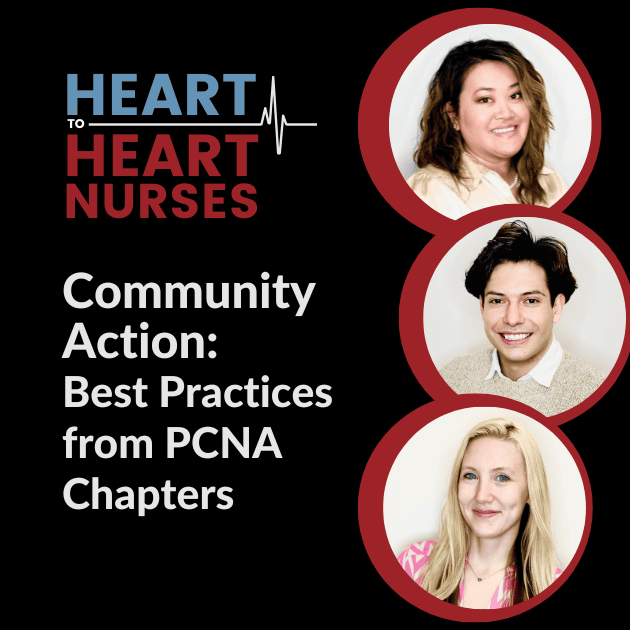The Southern Nevada PCNA chapter received the 2025 Chapter Award for outstanding contributions to their community. Learn about what has led to their success–and strategies you can implement in your own oworkplace and community–from chapter leaders Kredlen Dentscheff, MSN, RN, NPD-BC, David De Santiago, MSN Ed, RN MEDSURG-BC, CMSRN, CV-BC, and Charli Rose Saxton, BSN, RN, MEDSURG-BC, CMSRN, CV-BC.
Epsosde Resources
Southern NV podcast episode transcript
[00:00:00] I’m Erin Ferranti, board president for PCNA, and I’d like to welcome you to this episode of the Heart to Heart Nurses Podcast. PCNA is the proud home of cardiovascular nurses and one of the leading figures in the fight against cardiovascular disease. We have the resources you need for your day-to-day practice or to follow your passion to new areas of learning and growth.
Geralyn Warfield (host): (00:19.18)
Welcome to today’s episode. We are going to be doing things slightly differently than we usually do in these episodes. We actually have three guests with us today. And as you can see, we have three chairs. So, we are going to be doing this in two shifts. So, we’re going to take a break in the middle, and you’ll get to meet the rest of our great individuals that are our guests today after the break. Right now, I’d like to introduce our current guests. So, David, could you introduce yourself?
David De Santiago (guest):
Hi, good morning, everyone. My name is David de Santiago. I am one of the founding members for the Southern Nevada Chapter of PCNA. I work at a local hospital in Las Vegas, Nevada. I work in their cardiac med search floor. I’ve been there for about three years, where I pretty much initially started as a nurse extern on their pulmonary unit. But then I kind of made my way into the cardiac world and well, that’s where I’ve been.
Geralyn Warfield (host): Well, fabulous. Kay, how about you?
Kredlen (Kae) Dentscheff (guest):
I didn’t know that you worked in the pulmonary unit!
David De Santiago (guest):
Yes, I was an MPU.
Kredlen (Kae) Dentscheff (guest):
My name is Kay, and I work at a hospital in Las Vegas as well. I’m currently a quality coordinator and back then when we founded the Southern Nevada chapter, I was the educator at his facility. That’s why I was very surprised to learn that. Yeah, I didn’t know that.
Geralyn Warfield (host): (01:30.028)
That’s awesome. The thing about having a chapter is that you do get to know a lot about people. Apparently not everything all at once, and that’s totally all right.
But for our audience that doesn’t know this, the Southern Nevada Chapter just won the PCNA Chapter Award. And so that’s why we are so excited to have them all here and to share their experience of what it’s like to have a chapter.
I know that many people that are listening or watching this may not know what a PCNA Chapter is. So, David, do you want to tell us what you do as a chapter?
David De Santiago (guest):
Absolutely, absolutely. So, our founding president, who unfortunately isn’t here at the moment, Giselle, we love you, hearts. She approached us individuals, and was like, “Hey, I have an idea.”
And she was like, “OK, what kind of idea do you have?”
She’s like, “Let’s start a chapter here in Las Vegas,” because Las Vegas didn’t have a chapter. The closest thing to Las Vegas was either California, which I think has a few chapters, and Arizona, which I believe Arizona is here today [at the April 2025 PCNA Cardiovascular Nursing Symposium] as well.
And so, she was like, “Let’s give this a go.”
And I was like, “Sure, why not?” You know, I didn’t know what I was walking into. So, I think anybody can agree we didn’t know what we were walking into.
Kredlen (Kae) Dentscheff (guest):
I kind of knew. I asked her and another one of our members to create a presentation to show me what was going to be happening and what was required and what time was going to be required of me.
David De Santiago (guest):
Oh, well, I didn’t get that.
Geralyn Warfield (host): (02:50.262)
And I was going to say that it is a really important factor for those of you that are thinking about starting a chapter, that there is a time commitment. It’s not a full-time job, although it might feel like that when you’re putting together a chapter program.
David De Santiago (guest):
Correct.
Geralyn Warfield (host):
But really, you have to provide some commitment from your community. We don’t want you to be unsuccessful.
David De Santiago (guest):
Correct.
Geralyn Warfield (host):
So, we want you to have the support that you need and the audience in your area. So that’s why there was a little bit of paperwork, a little bit of coercing, I mean, you whatever it was that had to happen to get you to volunteer to help.
Kredlen (Kae) Dentscheff (guest):
Definitely coercing. Like “Hey, this is great for your resume.” Because you were a new grad at the time.
David De Santiago (guest):
I was, yeah. I was fresh off from nursing school. I was a unicorn in a sense. I was bright-eyed. I wanted to conquer the world. I wanted to do this, do that. Full of ideas. And well, this was pretty much a good outlet where I was able to get those ideas out.
Geralyn Warfield (host):
Fantastic.
David De Santiago (guest):
And so, she was like, “OK, let’s do this.” And I was like, “OK, cool, cool. Sign me up. What do we do?” And so we pretty much started from there.
We went to the, I think it was the first symposium together in New Orleans. It was pretty much eye-opening, seeing a whole bunch of individuals, like-minded individuals who wanted to elevate nursing, not just nursing in general, but cardiac nursing.
And so I was like, “Oh my gosh, I’m like, you’re just full of emotions. And so that was pretty much the start of this. And then we just started doing our events, one in the spring, one in the fall. And pretty much getting everything situated.
We spent time together. We kind of love each other. We of hate each other. It’s 50-50 sometimes.
And on top of that, we also made it a prerogative for our group to kind of give back to the community, try to reach out to the community. And so, me as the community chair did my part in trying to establish networks and collaborations with organizations within Las Vegas to kind of help get our name out.
We kind of had to market ourself in a little bit as well as give back to the community. And that’s pretty much where all of my passions coincide into what is the Southern Nevada PCNA Chapter.
Kredlen (Kae) Dentscheff (guest):
A huge part of what we do.
Geralyn Warfield (host):
That’s fantastic. And for each chapter, your area, your region, your neighborhood, your healthcare community is going to be different. So, what I hope our listeners and those people watching us will take away from today is maybe some pearls, some clinical pearls, some wisdom that they might be able to apply.
So, if you’re in a small remote area, if your chapter, for example, is a more rural setting, then maybe you won’t have quite as many resources right at your fingertips. But I think you’ll be surprised by how many people are willing to help out and willing to partner with you.
David De Santiago (guest): (05:42.028)
Absolutely, absolutely. And then, even us being in the city, we do get a lot of people that come from neighboring counties.
I can remember we had this one lady that was I think from Pahrump, which is a little outskirts out of the city. And she would come to the events just to kind of learn and take back to her community because unfortunately her community, is a much older population. And unfortunately they [the patient population] are not computer savvy where they were able to do telehealth.
Kredlen (Kae) Dentscheff (guest):
She lived in a food desert, that’s what she was saying.
David De Santiago (guest):
She said that she’s completely in a food desert. That they have a bunch of fast food and, being cardiac nurses, fast food is not your best friend. It’s your enemy, McDonald’s here and there isn’t that bad. You got moderation, moderation’s the key.
Kredlen (Kae) Dentscheff (guest):
We had fried onion rings last night with my salad.
David De Santiago (guest):
That is true.
Geralyn Warfield (host):
So, Kay, I heard when we were first starting our discussion today that you really wanted to know the time commitment upfront. So, what does that look like? And I realize it varies from month to month, season to season, but what kind of time commitment do you individually put into this project as a PCNA leader?
Kredlen (Kae) Dentscheff (guest): (06:50.078)
I feel like the very bare minimum. As much as I possibly can do, like everything is efficient and concise as possible.
Geralyn Warfield (host):
Okay.
Kredlen (Kae) Dentscheff (guest):
I think as a group we try to meet at least quarterly.
But then when we have like our spring and fall events happening, we progressively get more and more. And we’ll meet like about once every week or once every two weeks until we get closer, until the event happens.
Geralyn Warfield (host):
And are these virtual meetings? Do you meet in person?
Kredlen (Kae) Dentscheff (guest):
We do both.
We try to do Teams meetings, Skype, Zoom. Sometimes we’ll just be on iPhones and do video calls. Depending on what’s happening. Like I just had a baby so then everyone came over and that was like my baby’s part of the meeting now because I can’t do anything.
Speaker 4 (07:36.942)
And so, and then, I don’t know, we just make it work. Sometimes we make it fun, but then we learned we can’t hear anything and we get distracted. It’s fine.
Geralyn Warfield (host):
It does happen.
So, you were talking about community events; we’ve been talking about the spring and fall kind of programs that are open to the community. You don’t have to be a PCNA member to attend these events.
What’s the style like for you all? Some chapters have a weeknight, and they offer one CE and if there’s a commercial or product theater kind of thing with that, they do it like in a weekday evening.
Others stack together three CE programs and a product theater on a Saturday, so more people can come, they get more CE contact hours. What’s been working for your chapter?
David De Santiago (guest):
For us, it’s been a hit and miss, kind of trial and error, kind of thing. We did start big in the beginning with the three CEUs and stuff. And then on top of that, we were trying to get sponsors and all that stuff. And so, it was a kind of a little bit of a hassle because you had to do the three CEs plus the Q &A’s plus the sponsors.
Kredlen (Kae) Dentscheff (guest):
It took a very long time. And the feedback from our like audience at that time was like “Make it shorter.”
David De Santiago (guest):
Make it shorter. Don’t drag it on too long.
Kredlen (Kae) Dentscheff (guest):
And so, we’ve kind of taken the feedback from every event and did what they asked.
Geralyn Warfield (host): (08:54.638)
Great. I have one more question for this duo and that is how are you able to convince other people to come and present for you? Because oftentimes what you’re getting is you’re getting a slide deck from the PCNA office and you’re trying to find a local speaker. So, what does that process look like for your chapter?
David De Santiago (guest):
So far, we haven’t had any issues as of yet, As of yet, knock on wood, knock on wood, So, we’ve been fortunate enough to know individuals—we’ve had doctors, we’ve had nurse practitioners that we’re close with, we have a close relationship with who are very…
Kredlen (Kae) Dentscheff (guest):
…open to teaching. They want nurses to know more and do better.
David De Santiago (guest):
Correct.
Kredlen (Kae) Dentscheff (guest):
And I will say that of our previous relationships, our previous presenters have said, “I have a friend that wants to also teach” or “I can ask my group.” So we have luckily la bank that we could always reach out to if need be. And we try to keep those relationships lopen.
David De Santiago (guest): (10:03.766)
And then my word of mouth too as well too. Like they’re like, “I did this for so and so”, and “Hit this person up, give them a call,” or “I can’t do it because I don’t have the time for it, but I know a friend who’s willing to do it.” So, we reach out, we introduce ourselves, we introduce our mission or purpose and what we want to hopefully accomplish with that.
Geralyn Warfield (host):
Great. So, before I let the two of you go, I know one of the things that your chapter does really well and that you spoke about a little bit earlier was that actually being involved in the community and how does that look for your particular chapter?
David De Santiago (guest): Well, we’ve done we’ve done it all. We’ve done food distribution. We’ve done farm work at a community garden. We’ve gotten our hands dirty We’ve pretty much we’ve done everything. We’ve chaperoned dances.
Kredlen (Kae) Dentscheff (guest):
The Halloween Dance. Oh, that was so much fun.
David De Santiago (guest): (10:58.818)
That was so much fun. We’ve helped the American Heart Association. We have a close relationship with Nicole. Nicole, if you’re seeing this, hearts to you too, with the American Heart Association over in Las Vegas. And so she kind of reaches out, “Hey, I have this, do you guys want to help?” I’m like, “Sure, let’s do this!.
Kredlen (Kae) Dentscheff (guest):
David got to speak at the consulate.
David De Santiago (guest):
The Mexican consulate. Thanks to the REACH organization. So, Luis, if you’re watching this, you’re the homie. So, we speak to the Mexican Consulate as well as the consulate of El Salvador to kind of help reach the uninsured and underinsured population as well.
Geralyn Warfield (host):
Fantastic. I do have one more question for each of you, and that is what one takeaway would you offer to the audience in terms of being a successful chapter? What do you think is kind of the most core thing that you need to do to be a success? And again, I understand that every chapter is different, so what works for in Las Vegas may not work wherever our listeners are, but what do you think?
Kredlen (Kae) Dentscheff (guest):
Have fun. I think you have to have fun. It’s when everyone is a little too serious, we’re just here to do good things and we’re here to introduce you to new people. And we want you to share that with other people. And it shouldn’t be like, “Hey, we have something serious to talk to you about.” And then if you say that to me, I would shut down. I would fall asleep. So have fun.
David De Santiago (guest): (12:11.382)
Have fun. Just be humble.
Geralyn Warfield (host):
Be humbled.
Thank you both so very much for being here.
And I don’t want our audience to go away. We’re going to take a really brief break and we will be back with even more information about what it takes to have a great chapter.
Geralyn Warfield (host):
I’d like to welcome our audience back to today’s episode where we’re talking about chapter programs and PCNA. And we have a new guest after the break, as you might recognize. And Charli, could you introduce yourself to us, please?
Charli Saxton (guest):
Hi, I’m Charli Saxton. I’m another one of the Southern Nevada chapter leaders. We work together, but separately now at this point. So, I work at two different facilities. I work med tele, like post-cath ablation Watchman, and then I work, ICU at another facility. So, it’s kind of good to be able to see both sides.
Geralyn Warfield (host):
I think one of the other things that is a great opportunity for you all as you’ve started to work in different organizations, as you see how things operate differently wherever it is that you work in, then you can bring that back to the group and kind of share that, can’t you?
Charli Saxton (guest):
It’s great definitely, to be able to see what’s working in one facility and what’s not working in another, but also, “I have this patient and we did this,” whatever procedure that looks like, and then this is what we’re trending now. And then to be able to identify this was an area of need, or whatever that looks like.
So, the more people you connect with, they’re like, “I have this friend, they’re working on this project.” Or when we went to the AHA walk, we kind of networked with that community a little bit and that’s where we started building more relationships for our volunteer work that we do.
Geralyn Warfield (host):
That’s great. And I think nursing overall is simultaneously a group effort and an individual effort. And sometimes it’s hard when you’re in that individual moment getting the job done, dealing with all the things that happen, to forget that there’s a whole group of people that are out here ready to support you if you just ask.
And if you’re new to nursing, like many of you have been recently, I think sometimes the challenge is finding out who to go to for questions.
So, do you have any ideas that you could share with the audience? And it could be “get involved with a PCNA chapter,’ but that does not have to be the answer at all.
Charli Saxton (guest):
I think as a bedside nurse, I take a lot of pride in not needing help, which is my weakness because I will be the first to tell you if I ask for help, something terrible is happening. So as a bedside nurse, if I if I have to call one of my friends to be like, “I need help,” you better come running because it could be bad, whatever is happening.
So, I think you grow more as a nurse, the more you realize that it’s not your failure as a nurse, it’s
you’re needing more resources. You’re needing more resources.
So, I think as we become more experienced as a nurse, you start to learn it’s not, in our facilities that we all work in, you could have six or seven MedTeli patients. And those patients are very sick. And as we’ve learned here at the [PCNA Cardiovascular Nursing] conference, not only do they have cardiac disease, kidney disease, they have every disease process that you’re going to run into and cardiac patients tank hard and fast, so you’re going to need to be prepared.
(15:28.204) And I think we have grown more and more. And then through PCNA and through different nursing organizations we’re a part of, it just kind of helps you understand we are a team. You are by yourself at the bedside, but the second you start saying “I need help,” or “I think this patient might need this consult” or whatever that looks like to start building your team for your patient, it grows just like a massive wildfire and really provides the best care for your patients, which is why we’re here.
So, I think growing as a nurse becomes a big part of that, and understanding it’s not a weakness, it is you’re doing what’s right. And sometimes in the nursing community, we feel like you don’t want to ask for help because why aren’t you able to do it? You should be able to do this, you should be able to do this.
We’re told from when you graduate, “You’ve got this, you’re going to be able to take care of however many patients now, you’re strong, you’ve got this.”
So, when you need help, it feels like “I should be able to do this.” And that’s not necessarily the case, because these patients are very sick. So, I think growing your network and growing who you can trust and kind of building those relationships is important and then we lean on each other, which I think is vastly important.
So I don’t know if that answered your question?
Geralyn Warfield (host):
No, it did.
I think one of the other considerations for individuals who are thinking about participating in a chapter program or starting a chapter is that nobody comes out of nursing school with a degree in cardiovascular nursing. And so what you just described is, yes, I had a certain skill set, I’ve got a knowledge base, I’m confident, but I don’t know everything.
And so that’s why it’s important to continue to learn along the way.
Charli Saxton (guest):
100% I’m a strong believer and nurses have to be lifelong learners because medicine changes ever so fast. And being in a hospital setting you could come so I work three days and then I go to a different facility and then I come back and it could be ten days later that I’m back.
You know how much has changed? It could be nothing, it could be ten things. You don’t know what you’re walking into.
So, I think it’s vastly important to be a lifelong learner and be able to grow and develop yourself, but also your nursing expertise because it is wildly changing.
And even being at the conference here, we have learned so much in the last 10 years of medicine, let alone what’s coming. And when you go to a conference and you’re able to see these great things are coming; we’ve talked to a lot of the different device reps and seen all of the devices that are coming down the pike and it’s great to learn about all these new things.
There’s been a lot of talk about amyloidosis and they’re going to talk about it at our event that’s coming up. So, we were like, “Oh, this is great because we don’t know a lot about that.” As inpatient nurses, we don’t see a lot of that and it’s coming down the pike. It was triggering us like, “Oh, I wonder if these patients that were not finding anything, we’re wondering, maybe they have something else going on. And we’re wondering, “Are they following up in the clinic?”
So, it triggered us all to think like, we should ask them when they get discharged in the clinic, because we have those relationships with our providers now, “Are you guys following up on, you had this unstable angina, or you had this NSTEMI, but we didn’t identify an issue. What is the follow up after that?”
And where are we going from there? Because that’s a big piece of discharge education. (19:19.438)
People are like, “Well, what happens now?”
“Well, you’re going to fall off in the clinic and it’s going to be great.” But we don’t know, because we’re not in the clinic.
So, I think that is something that we want to build is a stronger relationship with our cardiac clinics as well, because it would be great to be able to be, “Oh, I know so and so in the clinic, they’re going to be great. We’ve had great relationships with them. They’re going to help you kind of grow into your next steps as a cardiovascular patient.”
Geralyn Warfield (host):
That’s awesome. So, as we’ve talked about, a lot of the information that your chapter shares comes through these spring and fall programs. How do people learn about these learning opportunities about amyloidosis or whatever the topic is?
Charli Saxton (guest):
So, our spring and fall event, we decided right out the gate that we were going to make an Instagram page because that is the way that our nursing community functions a lot is through social media and building those connections, networking, however you want to look at it
So, we built our own PCNA page for our chapter and then we post, “Hey, we have this upcoming event.” More and more and more as we get closer to our event,.
But we also are really incredibly lucky to be able to advertise our events in our hospitals. So, we all started at a big hospital in Las Vegas, but now we have kind of disseminated out a little bit. So, it’s great because we work in other facilities. So, we can say, through that facilities education department, we can say, “Hey, we have this event coming up. You don’t have to be a cardiac nurse. You don’t have to be a nurse at all.”
But also, we can widen our network like that. Working for different hospital systems, or working through the connections that we’ve made, we’ve been able to kind of bridge out a little bit more because we started with our original event in our hospital and then have kind of spread out a little bit.
So, we’ve gone to different hospitals now and then this time we’re actually doing an out-of-facility event. So, this is our first non-hospital event. (21:22.028) We’re super excited because we chose a facility that has physical activity involved. So, we’re going to do our event but also have some physical activity because a big thing is when you go to a conference or you go to a speaking event, then you’re sitting for a long time and that’s difficult for some of us.
Geralyn Warfield (host):
Well, that’s a great model to consider for other chapters that are thinking about what to do in terms of where to host an event and those kinds of things. So that’s a great idea.
I know that your chapter is relying on the expertise of the people that we’ve seen and some others to be the leadership team. And in any organization, it’s important to look at who, in this case, is next in terms of developing that leadership ladder. So, I didn’t know if you had identified a strategy for replacing yourselves eventually when things need to transition for whatever reason. Not that you are not doing an exceptional job, please don’t take it that way, we want you never to leave, but should you need to leave, what would that look like for your chapter?
Charli Saxton (guest):
I definitely think like in this season of life, we’re all growing. And as we said, like we’re all at different facilities, which can be tricky to coordinate our schedules or even coordinate an event. Because, some people work five days a week. Some people work three days a week. Some people work six days a week. It just depends on what your life season looks like. So, I definitely think that is a huge challenge for people in organizations, baseline.
But we are trying to establish what the next steps will look like. And we love each other and we’re the first to be like, “Guys, this is a lot for me right now and I’m going to need to pull back a little bit.”
I think the best part about our chapter is we know each other and we read each other relatively well. So, we can be like, “they’re struggling. We’re going to just kind of take that piece.” Or, “This isn’t working well. What can I do to help you?” kind of thing?
(23:28.18) But moving forward with trying to identify like who we could grow up with us, I think is challenging and getting people to commit is challenging, but we are working to identify people who want to grow as nurses and understand it is a commitment, but it’s more of a commitment to ourselves than it is like a vast time commitment.
Because like Kay said, we meet quarterly, then we’ll be like, “Hey, we’re going to do this volunteer [event].” We are not arranging our own volunteer events at this point. We’re just kind of supporting other people who already have things set up. So, I think that alleviates some of the time commitment pressure.
The only things that we’re self-growing right now is our spring and fall event. So that when people understand it’s not a 12-hours-a-month, period, it’s we could do an hour of volunteering or two hours one each month, and that’s your commitment. And then we kind of move forward.
And we this year have kind of blocked out, I think in December, November, we said this is the quarter breakdown. We’re going to do the symposium. We’re going to do our spring and fall event. We wanted to do, I can’t even think of the other things that we’ve set, but we’ve set some other core things that we were like, this is what we want to accomplish. We wanted to go to the garden. We did that.
And so, identifying that really early kind of eliminates the stress of, “My gosh, we haven’t done anything,” or our time commitment restraint. And so, I think as more people are seeing that, the more people we are able to kind of pull into our events. They ask, “What does this take?” Or asking and making those connections, I think, is how we build our brand, but also kind of grow our PCNA chapter itself.
And then, people are more willing to be like, “I could take that piece. I have some room in my life. I could take that little slice of your pie.” So, I think that’s been helpful for us.
And then we work in a massive facility. So, we have a lot of people coming and going, but also, we have a massive new grad program. And I think that six months in, our new grads are really struggling. And so, it kind of gives them an outlet, maybe (25:52.824) getting some outside experience or getting some additional feedback on where my nursing can grow, I think has been helpful for people.
This will help you in getting that outlet of getting your nursing fire back,” because it can be really difficult.
Geralyn Warfield (host):
And I know I asked the other guests, and I’m going to ask you what’s one key takeaway that you would provide to our audience in terms of what makes a successful chapter.
Charli Saxton (guest): I think doing it with people that you enjoy, like camaraderie is important. So first, we are all friends. We were coworkers, but we’re all friends. And doing something that can be challenging is a lot easier when you have people that I’m like, “I don’t know anything about that.” I’ll be the first one to tell you that’s not my wheelhouse. There’s a lot of things I know, but I don’t. communicate well, normally with people that I don’t know. That’s not me. So, I can do these things and knowing your own skills. I think having fun with people but also doing organizational work with people that you’re comfortable with is wickedly important.
Geralyn Warfield (host):
Well, thank you so very much for being here, and thanks to our other guests as well. This is Geralym Warfield, your host, and we will see you next time.
Thank you for listening to Heart to Heart Nurses. Visit PCNA.net for clinical resources, continuing education, and much more.
Topics
- Professional Development
Published on
August 19, 2025
Listen on:
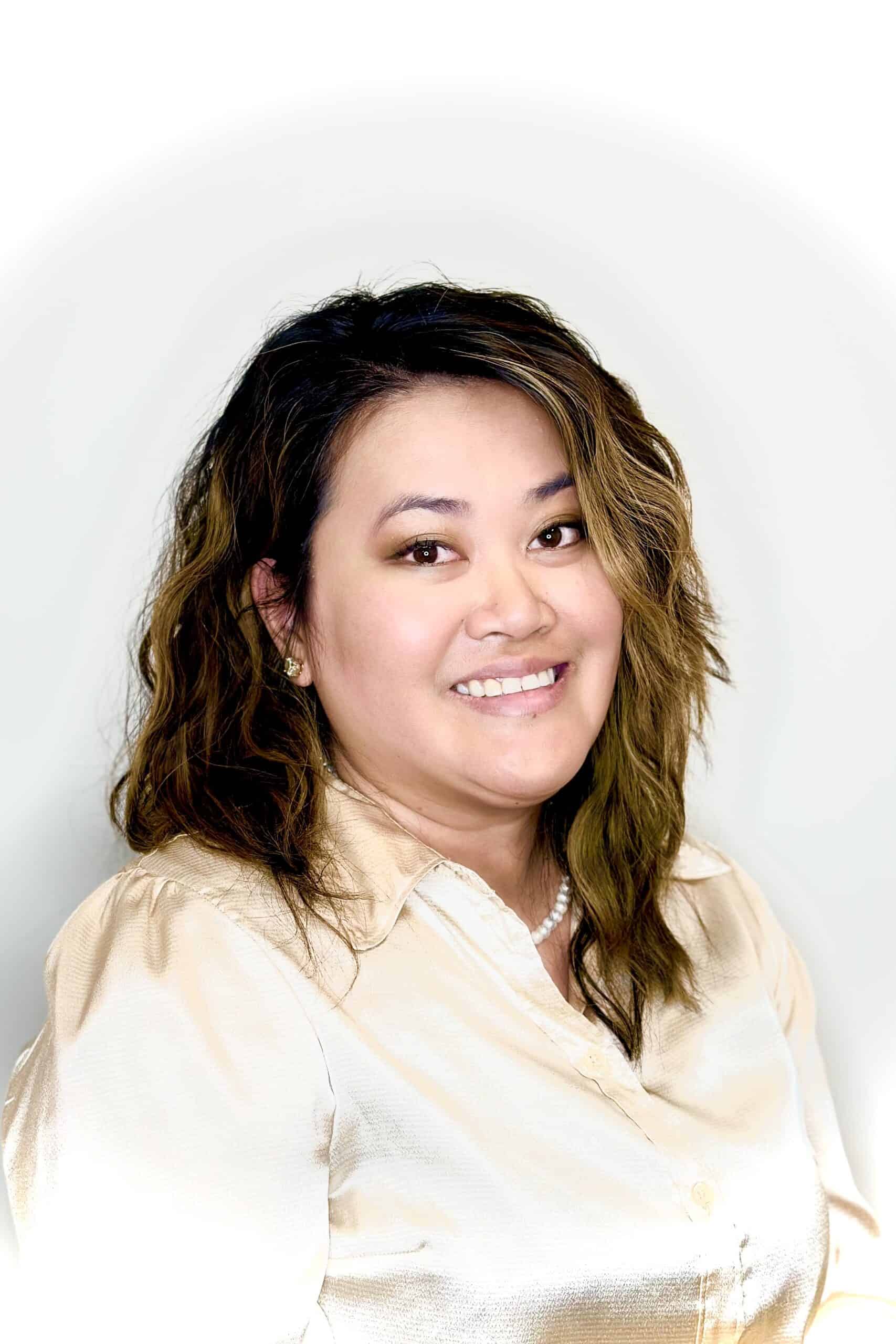
BSN, RN, NPD-BC
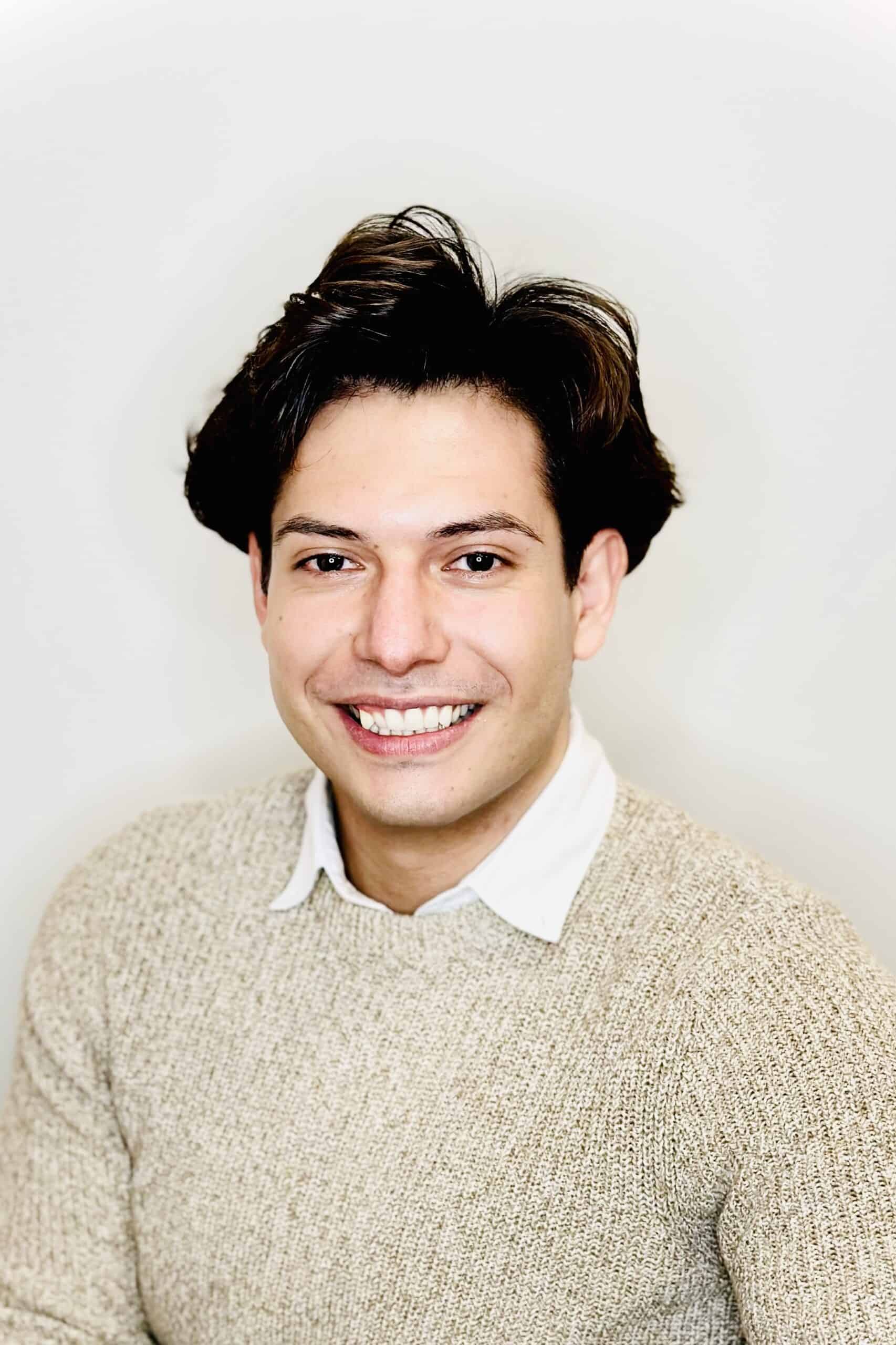
MSN Ed, RN MEDSURG-BC, CMSRN, CV-BC
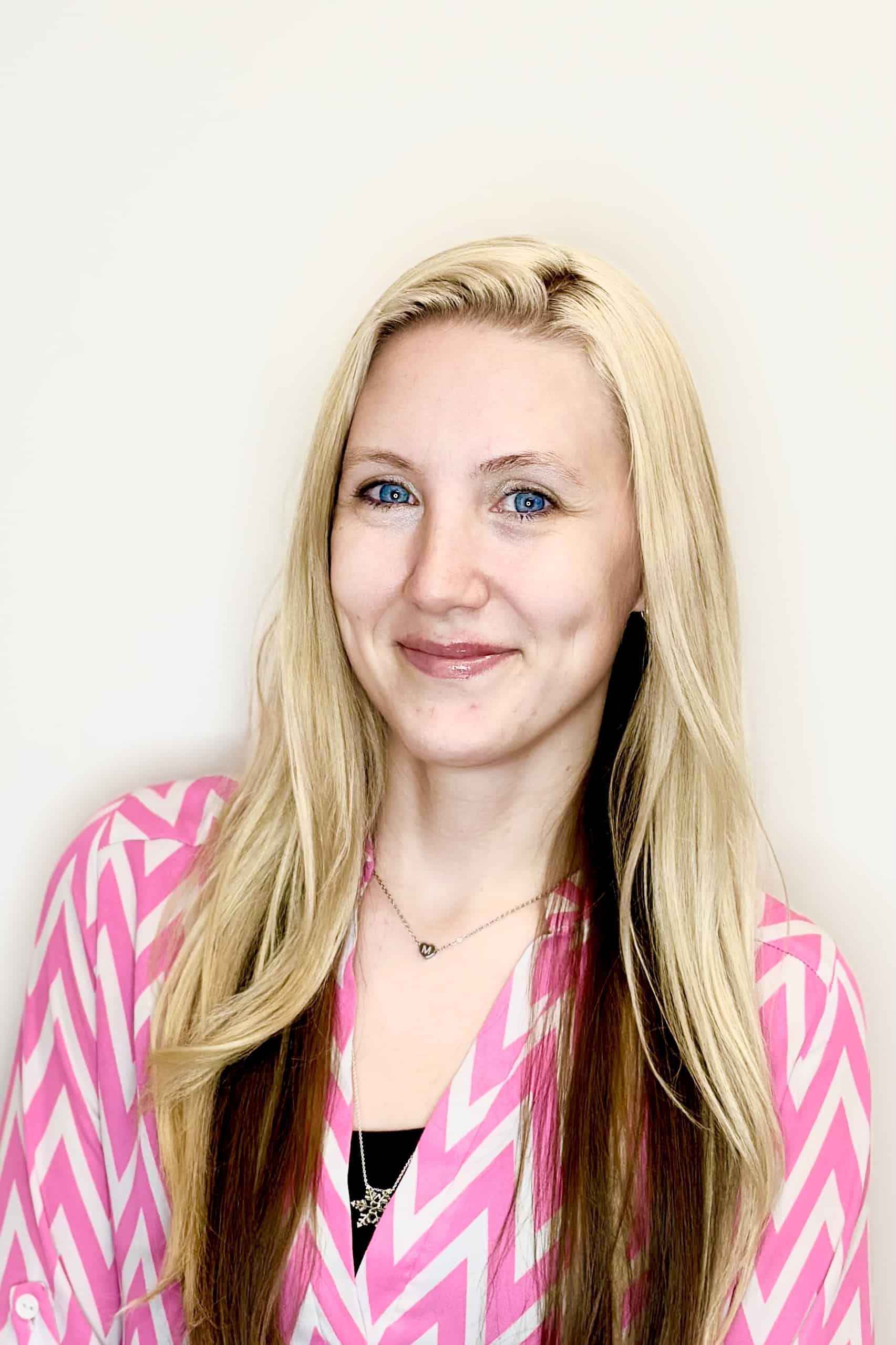
BSN, RN, MEDSURG-BC, CMSRN, CV-BC
Related Resources
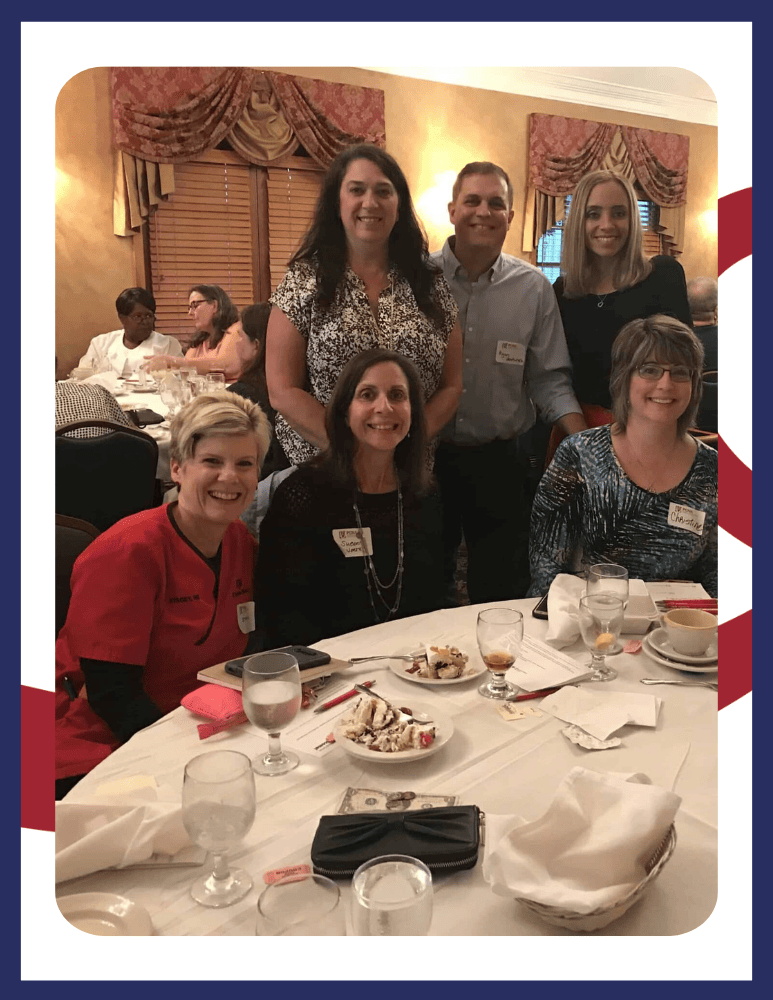
Chapter Resources
Hosting a Successful Chapter Meeting
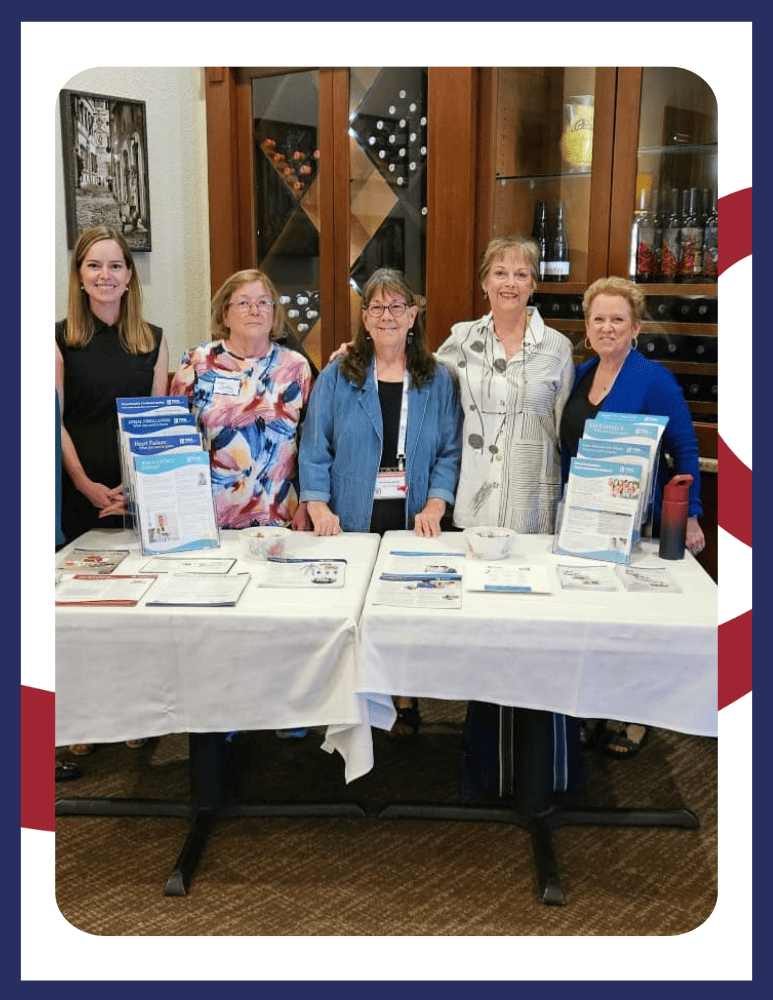
Chapter Resources






